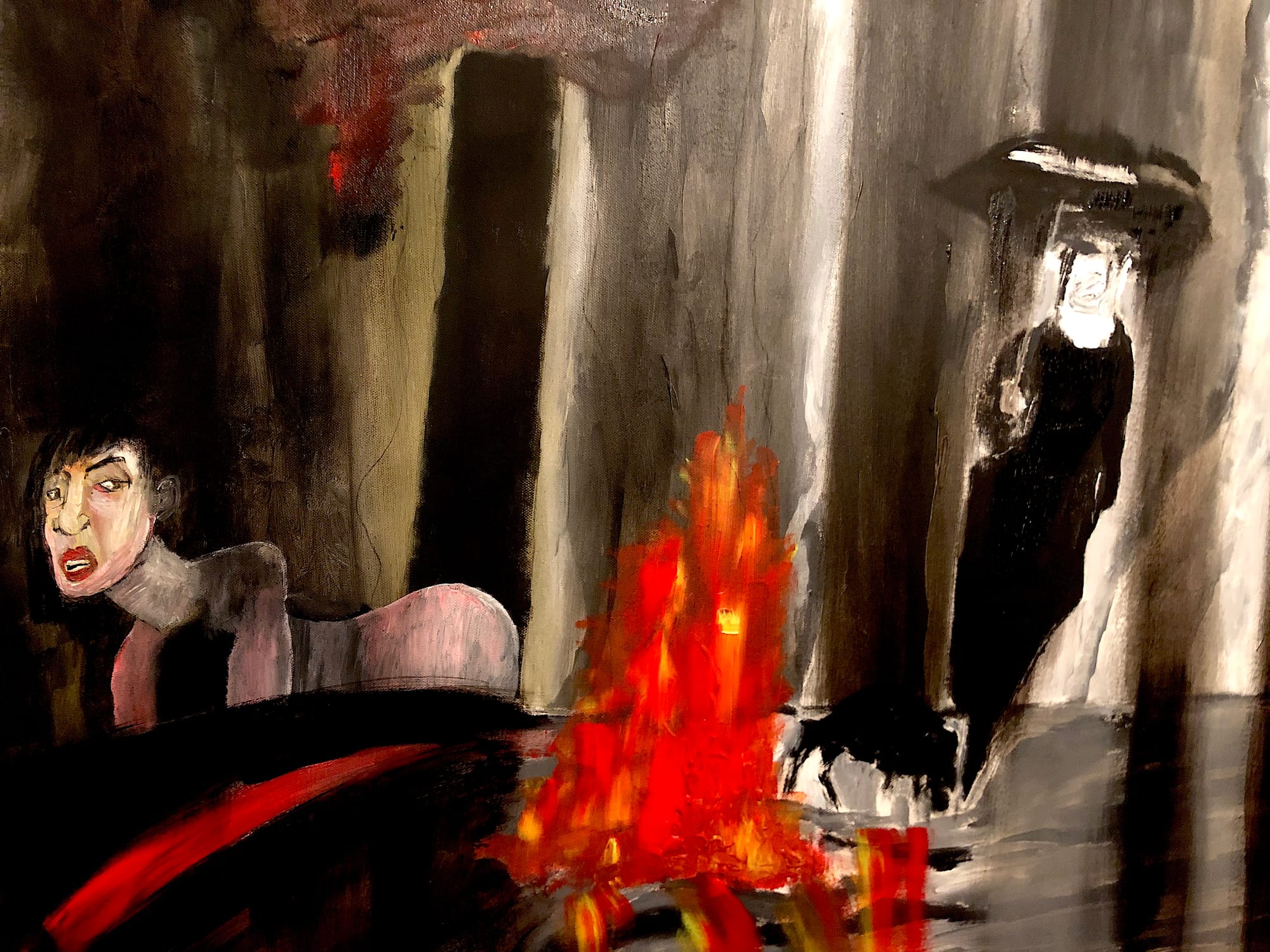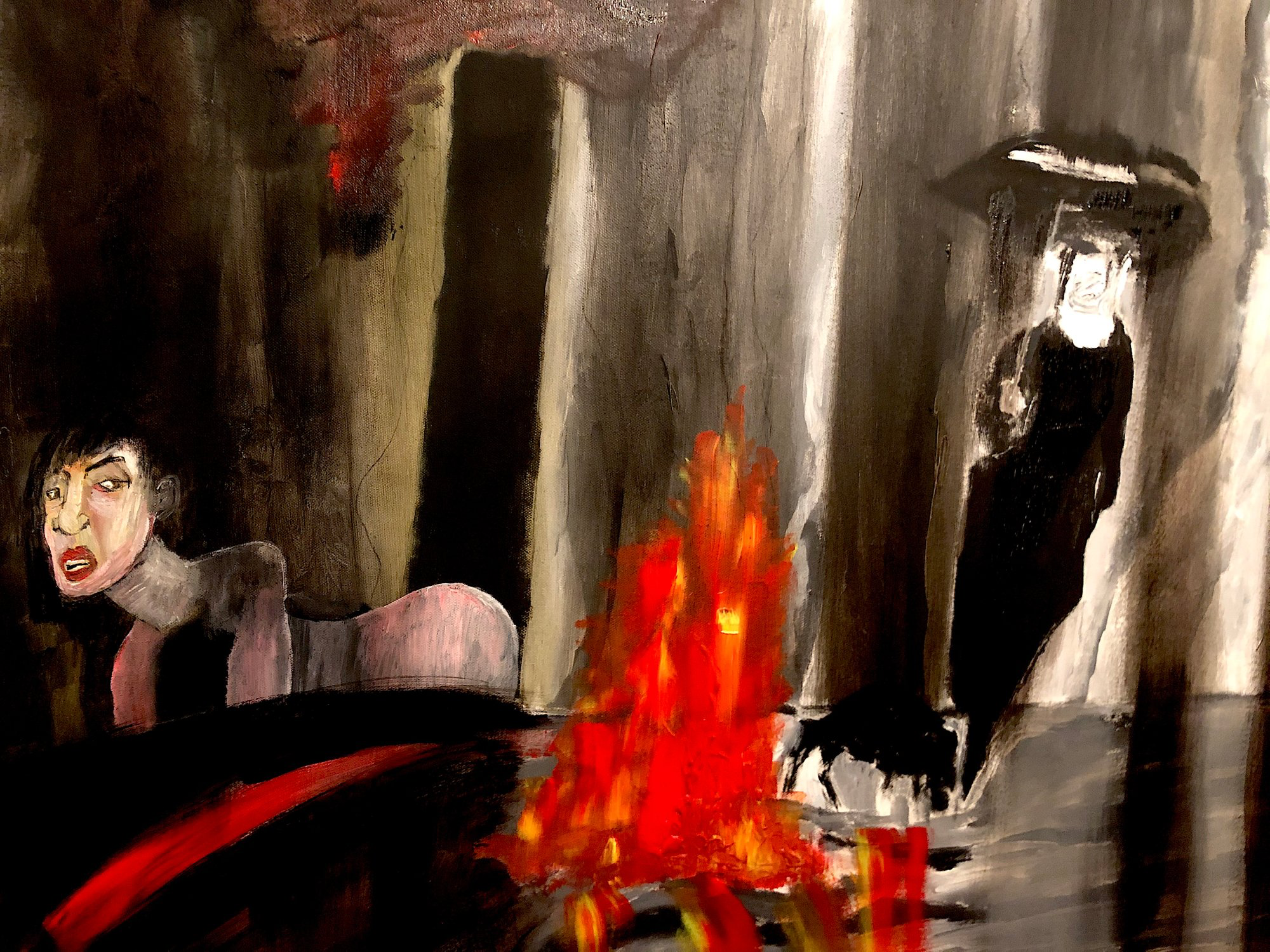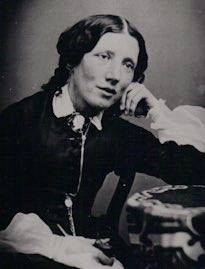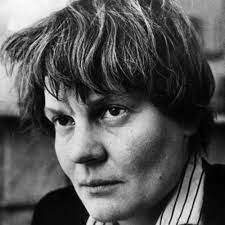Pandemic Conversations 4: Iris Murdoch and Harriet Beecher Stowe

Out of my window in an anxious and resentful state of mind, oblivious to my surroundings, brooding perhaps on some damage done to my prestige suddenly I observe a hovering crow. In a moment everything is altered. The brooding self with its hurt vanity has disappeared. There is nothing now but crow. Two figures emerge out of the blustery haunted edge of weather far down the way. One looks like Iris Murdoch and the other Harriet Beecher Stowe and like whispers their words flap and bang about in the wild air's excitement.

Iris Murdoch: Perhaps when distant people on other planets pick up some wavelength of ours all they hear is a continuous scream.
Harriet Beecher-Stowe: In real life we do not die when all that makes life bright dies to us. Never give up, for that is just the place and time that the tide will turn.
IM: We are such inward secret creatures, that inwardness the most amazing thing about us, even more amazing than our reason. But we cannot just walk into the cavern and look around. Most of what we think we know about our minds is pseudo-knowledge. We are all such shocking poseurs, so good at inflating the importance of what we think we value.
HB: Have not many of us, in the weary way of life, felt, in some hours, how far easier it were to die than to live? The martyr, when faced even by a death of bodily anguish and horror, finds in the very terror of his doom a strong stimulant and tonic. There is a vivid excitement, a thrill and fervor, which may carry through any crisis of suffering that is the birth-hour of eternal glory and rest.But to live, to wear on, day after day, of mean, bitter, low, harassing servitude, every nerve dampened and depressed, every power of feeling gradually smothered, this long and wasting heart-martyrdom, this slow, daily bleeding away of the inward life, drop by drop, hour after hour, this is the true searching test of what there may be in man or woman.
IM: Anything that consoles is fake. We need to return from the self-centred concept of sincerity to the other-centred concept of truth. We are not isolated free choosers, monarchs of all we survey, but benighted creatures sunk in a reality whose nature we are constantly and overwhelmingly tempted to deform by fantasy. Our current picture of freedom encourages a dream-like facility; whereas what we require is a renewed sense of the difficulty and complexity of the moral life and the opacity of persons. We need more concepts in terms of which to picture the substance of our being; it is through an enriching and deepening of concepts that moral progress takes place. Simone Weil said that morality was a matter of attention not of will. We need a new vocabulary of attention.
HB: I am speaking now of the highest duty we owe our friends, the noblest, the most sacred--that of keeping their own nobleness, goodness, pure and incorrupt...If we let our friend become cold and selfish and exacting without remonstrance, we are no true lover, no true friend.
IM: Everything was love. Everything will be love. Everything has been love. Everything would be love. Everything would have been love. Ah, that was it, the truth at last. Everything would have been love. The huge eye, which had become an immense sphere, was gently breathing, only it was not an eye nor a sphere but a great wonderful animal covered in little waving legs like hairs, waving oh so gently as if they were under water. All shall be well and all shall be well said the ocean. So the place of reconciliation existed after all, not like a little knot hole in a cupboard but flowing everywhere and being everything. I had only to will it and it would be, for spirit is omnipotent only I never knew it, like being able to walk on the air. I could forgive. I could be forgiven. I could forgive. Perhaps that was the whole of it after all. Perhaps being forgiven was just forgiving only no one had ever told me. There was nothing else needful. Just to forgive. Forgiving equals being forgiven, the secret of the universe, do not whatever you do forget it. The past was folded up and in the twinkling of an eye everything had been changed and made beautiful and good.
HB: Love is very beautiful, but very, very sad. The heart has no tears to give, -it drops only blood, bleeding itself away in silence. Love needs new leaves every summer of life, as much as your elm-tree, and new branches to grow broader and wider, and new flowers to cover the ground.
IM: We need a moral philosophy which can speak significantly of Freud and Marx and out of which aesthetic and political views can be generated. We need a moral philosophy in which the concept of love, so rarely mentioned now, can once again be made central.
HB: I don't know anything about politics, but I can read my Bible; and there I see that I must feed the hungry, clothe the naked, and comfort the desolate; and that Bible I mean to follow. It says: When thou passest through the waters, I will be with thee, and the rivers they shall not overflow thee; when thou walkest through the fire, thou shalt not be burned, neither shall the flame kindle upon thee; for I am the Lord thy God, the Holy One of Israel, thy Saviour.
IM: What a queer gamble our existence is. We decide to do A instead of B and then the two roads diverge utterly and may lead in the end to heaven and to hell. Only later one sees how much and how awfully the fates differ. Yet what were the reasons for the choice? They may have been forgotten. Did one know what one was choosing? Certainly not.
HB: We ought to be free to meet and mingle, --to rise by our individual worth, without any consideration of caste or color; and they who deny us this right are false to their own professed principals of human equality.
IM: I've felt as if I didn't exist, as if I were invisible, miles away from the world, miles away. You can't imagine how much alone I've been all my life.
HB: When a heavy weight presses the soul to the lowest level at which endurance is possible, there is an instant and desperate effort of every physical and moral nerve to throw off the weight; and hence the heaviest anguish often precedes a return tide of joy and courage.
IM: What greater torment than to see that light, and then to see it eternally withdrawn?
HB: There's a way you political folks have of coming round and round a plain right thing; and you don't believe in it yourselves, when it comes to practice.
IM: To overthrow a tyrant, whether in public or in private, one must learn to hate.
HB: No - to live,—to wear on, day after day, of mean, bitter, low, harassing servitude, every nerve dampened and depressed, every power of feeling gradually smothered,—this long and wasting heart-martyrdom, this slow, daily bleeding away of the inward life, drop by drop, hour after hour,—this is the true searching test of what there may be in man or woman.
IM: I have seen much of human beings over a long period, and I have learnt how little good to expect from them. You see, nobody cares about me except you. You don't know what that's like. You've always had people who cared. You've always had people. I've never had anybody. No wonder I feel frustrated. One can be too ingenious in trying to search out the truth. Sometimes one must simply respect its veiled face. Of course this is a love story.
HB: The gift to appreciate and the sense to feel the finer shades and relations of moral things, often seems an attribute of those whose whole life shows a careless disregard of them. Hence Moore, Byron, Goethe, often speak words more wisely descriptive of the true religious sentiment, than another man, whose whole life is governed by it. In such minds, disregard of religion is a more fearful treason,—a more deadly sin.
IM: I don't want to be a nebulous bit of ectoplasm straying around in other people's lives. That sort of vague sympathy with everybody precludes any real understanding of anybody . . . And it precludes any real loyalty to anybody.
HB: If we would not meet trouble for a good cause, we were not worthy of our name.
IM: I jwant to serve and help people and be good to everybody, only it always goes wrong somehow—I think about suicide all the time, every bloody day I want to die and stop this torture, but I go crawling on . . . I'm so Christ-awful bloody lonely I could scream with it for hours on end. I live, I live, with an absolutely continuous sense of failure. I am always defeated, always.
HB: I am braver than I was, because I have lost all; and he who has nothing to lose can afford all risks.
IM: How hardening to the heart it must be to do this thing: to change an innocent soaring being into a bundle of struggling rags and pain.
HB: Let me explain it to you, my dear lady. Loving to be admired by a man, loving to be petted by him, loving to be caressed by him, and loving to be praised by him, is not loving a man. All these may be when a woman has no power of loving at all, — they may all be simply because she loves herself, and loves to be flattered, praised, caressed, coaxed; as a cat likes to be coaxed and stroked, and fed with cream, and have a warm corner. But all this is not love. It may exist, to be sure, where there is love; it generally does. But it may also exist where there is no love. Love, my dear, is self-sacrifice; it is a life out of self and in another.
IM: But I've got a kind of misery that makes me blind and deaf. You wouldn't understand. You live in the open with all of you spread out around you. I'm mangled in a machine. Even to say it's my own fault doesn't mean anything. Of course we live in dreams and by dreams, and even in a disciplined spiritual life, in some ways especially there, it is hard to distinguish dream from reality. In ordinary human affairs humble common sense comes to one's aid. For most people common sense is moral sense. But you seem to have deliberately excluded this modest source of light. Ask yourself, what really happened between whom all those years ago? You've made it into a story, and stories are false. Our planet is a freak which we shall destroy by our own wicked senseless activities in the next century. Our history will very soon come to an end. Now that God is dead, we are at last presented with the truth, yes, the truth remains, but it is on a short lead. Anyway, we are nothing and it matters not what we do.
HB: Common sense is seeing things as they are; and doing things as they ought to be. The greater the interest involved in a truth the more careful, self-distrustful, and patient should be the inquiry. If you only trust in God, and try to do right, he'll deliver you. Not one throb of anguish, not one tear of the oppressed, is forgotten by the Man of Sorrows, the Lord of Glory. In his patient, generous bosom he bears the anguish of a world. Bear thou, like him, in patience, and labor in love; for sure as he is God, "the year of his redeemed shall come.
IM: Freedom, we find out, is not an inconsequential chucking of one’s weight about, it is the disciplined overcoming of self. Humility is not a peculiar habit of self-effacement, rather like having an inaudible voice, it is self-less respect for reality and one of the most difficult and central of all virtues.
HB: What is freedom to those young men, who sit there, with their arms folded over their broad chests, the tint of African blood in his cheek, dark fires in his eyes,—what is freedom to George Floyd? It is the right of a man to be a man, and not a brute; the right to call the wife of his bosom his wife, and to protect her from lawless violence; the right to protect and educate his child; the right to have a home of his own, a religion of his own, a character of his own, unsubject to the will of another. The bitterest tears shed over graves are for words left unsaid and deeds left undone.
IM: How mysterious night and day are, this endless procession off dark and light....I think such sad thoughts - of people in trouble and afraid, all lonely people all prisoners. Why do I always have to be helping people . . . and getting no help myself? I crave for love, everybody does . . . and I've never had a bloody crumb of it—and I've given so much love to people—I can really love people, I can, I let them walk over me—but nobody's ever loved me.
HB: There are in this world blessed souls, whose sorrows all spring up into joys for others; whose earthly hopes, laid in the grave with many tears, are the seed from which spring healing flowers and balm for the desolate and the distressed.
IM: There is no good, the tendency to evil is overwhelming. One has only to think of the horrors of sex, its violence, its cruelty, its filthy vulgarity, its descent into bestial degradation. You had better go and dream in your monastery.
HB: Any mind that is capable of a real sorrow is capable of good.
IM: You still fail to realise how this sort of talk sickens me. Now please go.
Rain begins to fall and the sky dazzles. They rush away into the startling emptiness.

